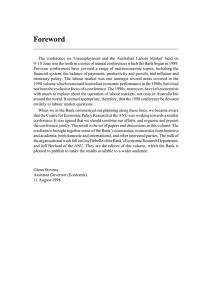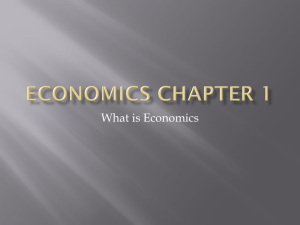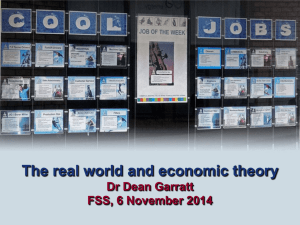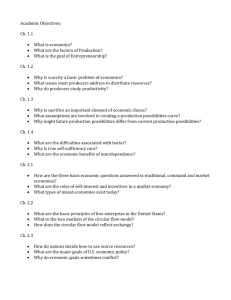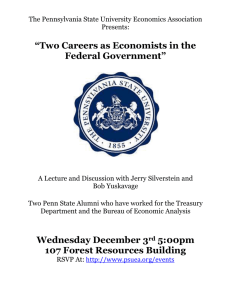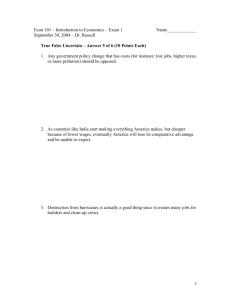Luigi Campiglio dip. di Economia Politica Università Cattolica del Sacro Cuore Milano, Italy
advertisement
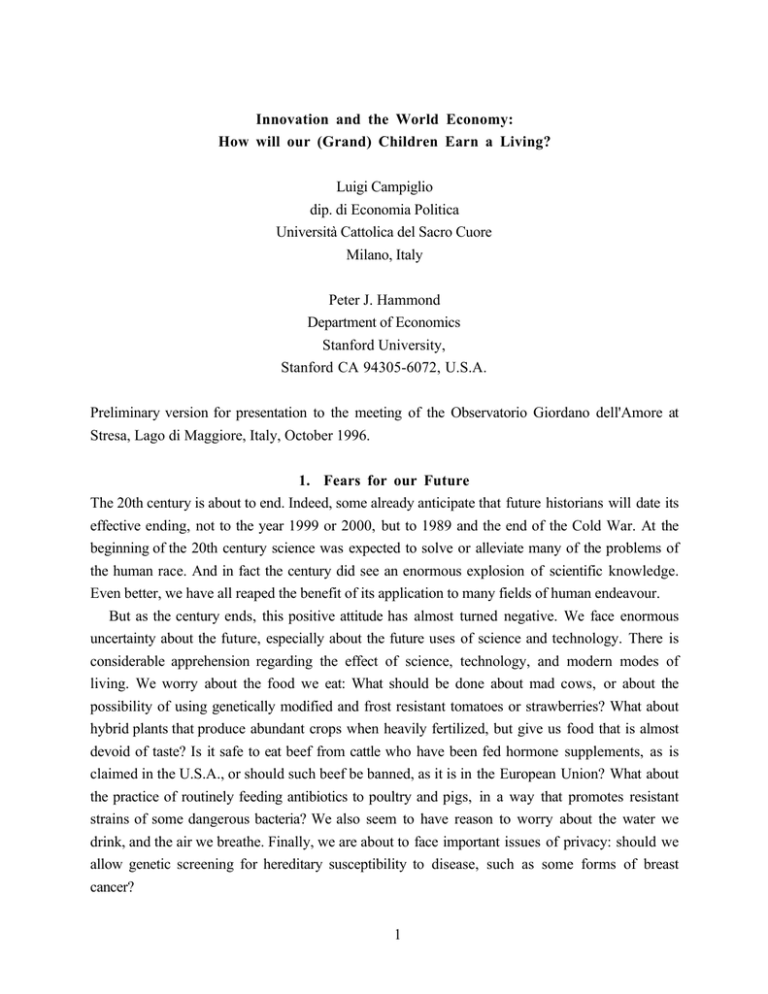
Innovation and the World Economy: How will our (Grand) Children Earn a Living? Luigi Campiglio dip. di Economia Politica Università Cattolica del Sacro Cuore Milano, Italy Peter J. Hammond Department of Economics Stanford University, Stanford CA 94305-6072, U.S.A. Preliminary version for presentation to the meeting of the Observatorio Giordano dell'Amore at Stresa, Lago di Maggiore, Italy, October 1996. 1. Fears for our Future The 20th century is about to end. Indeed, some already anticipate that future historians will date its effective ending, not to the year 1999 or 2000, but to 1989 and the end of the Cold War. At the beginning of the 20th century science was expected to solve or alleviate many of the problems of the human race. And in fact the century did see an enormous explosion of scientific knowledge. Even better, we have all reaped the benefit of its application to many fields of human endeavour. But as the century ends, this positive attitude has almost turned negative. We face enormous uncertainty about the future, especially about the future uses of science and technology. There is considerable apprehension regarding the effect of science, technology, and modern modes of living. We worry about the food we eat: What should be done about mad cows, or about the possibility of using genetically modified and frost resistant tomatoes or strawberries? What about hybrid plants that produce abundant crops when heavily fertilized, but give us food that is almost devoid of taste? Is it safe to eat beef from cattle who have been fed hormone supplements, as is claimed in the U.S.A., or should such beef be banned, as it is in the European Union? What about the practice of routinely feeding antibiotics to poultry and pigs, in a way that promotes resistant strains of some dangerous bacteria? We also seem to have reason to worry about the water we drink, and the air we breathe. Finally, we are about to face important issues of privacy: should we allow genetic screening for hereditary susceptibility to disease, such as some forms of breast cancer? 1 Where innovation is proceeding most rapidly at the time, in medical technology, biogenetics, and pharmaceuticals, there are promises of wonderful benefits to some people in desperate need of much more effective life-saving medical treatment. But there is also the risk that only a minority of those needing such treatment will be able to afford even the kind of medical insurance scheme that provides access to these new marvels. And one may doubt if taxpayers will be willing to pay to make such treatments available to all who need them. There is some very good news here, however, which is that the most recent innovations may be moving in directions that will significantly lower the cost of effective treatment. Quite apart from uncertainty about technology, there is in addition tremendous uncertainty about the economic future of the so-called developed world we live in and about the future job opportunities there are likely to be, faced as we seem to be with strenuous competition from eager workers in the third world — especially in South-East Asia and, for those of us who live in the U.S.A., also from workers in Mexico. Often, by the way, these are workers for multinational companies whose headquarters are to be found in the developed world. Thus, the world community has been forced to recognize that scientific and technical innovations, if improperly used, can make wars more destructive, crime harder to eradicate, and food tasteless if not actually poisonous or otherwise dangerous to health. They can also remove worthwhile job opportunities for the low skilled. Properly used, however, they can allow more efficient production of desirable goods and services in the economy. We can obtain more of what we want at lower cost — that is, with less hard work, less need for land, less unfavourable impact on the environment, lower pollution, etc. The question we address, therefore, is whether a suitably arranged world economic system could help ensure that innovations are beneficial, and used in ways that allow the gains from technical progress to be diffused through the population. After all, many critics claim that currently such gains are being concentrated in the hands of a powerful and power hungry minority who are, for the most part, already relatively wealthy. Another question is whether such diffusion of benefits remains possible after taking into account the need to provide economic incentives for people to create new products, work more productively, or otherwise enhance the productivity of the world economy. Finally, we shall pay particular attention to the likely employment effects of technical progress. We shall try to explain why most people in this audience may feel themselves to be working harder than ever — and not just because of the effort to understand what we are saying! All this while unemployment in many European countries is at or near a post-war high, and while many Americans feel dissatisfied at what seems to be an increasing proportion of seriously underpaid jobs which fail to afford those who accept them a tolerable standard of living in what purports to be a modern developed economy. In addition, we shall consider whether global competition is really 2 the threat that many see it as, or whether instead it will enable us all to benefit from cheaper manufactured goods and even services at little cost to the lifetime prospects of workers in the developed world, either now or in the future. 2. Potential Pareto Improvements from Innovation Especially during the last 25 years, we have become so accustomed to the pace of technological innovation that there is a danger of taking it for granted. And also of accepting unthinkingly the idea that most such innovation, like knowledge itself, is indeed beneficial. But is it really? Consider the case of an embittered 55-year old clerk who has just lost his job tracking invoices because a modern computer network can do the same job at much less cost with many fewer employees. How are you going to convince him that the computer revolution is beneficial? Economists have long understood that virtually any change in the economic system is likely to benefit some people but harm others. A classic change that has long been debated is the promotion of free international trade. In the 19th century, Britain's Corn Laws imposed import tariffs on wheat and other foodstuffs. Abolishing those tariffs benefited almost all the British people of the time. But they did harm two groups: landowners whose agricultural land became less valuable, and some agricultural workers who were displaced from jobs on the land faster than they might have been otherwise. This particular change is usually regarded as desirable because the gains of the many outweighed the losses of the few, especially as a signicant proportion of the few losers were relatively wealthy landowners. Economists talk of a "Pareto improvement" in the unlikely case when everybody benefits from a change. In the more typical case, there might be what is generally described as a "potential Pareto improvement". This occurs when those who gain, like most of the British population after the Corn Laws were repealed, could afford to compensate those who would otherwise lose, like the British landowners and agricultural workers, in a way that makes the overall effect a Pareto improvement in which, ultimately, all benefit. Many standard policy reforms which liberal or laissez faire economists advocate are justified, to the extent that they are justified at all, because they are seen as bringing about a potential Pareto improvement. Promotion of free trade is, as I have already mentioned, a classic example. Others include measures to replace rationing with prices, enhance competition, abolish foreign exchange controls, reduce taxation. These are all instances of what economists often call "liberalization" because they involve a move toward freer markets. In some sense, these are all forms of economic innovation — that is, of innovation in the way the economic system is organized. There are two less well known examples. One concerns the formation of a customs union with its common external tariffs suitably arranged so that aggregate trade beween the union and the rest of the world is not discouraged or diverted elsewhere. The second concerns migration, not of refugees seeking 3 to escape persecution or war, but of ordinary workers looking for better economic prospects — so called "economic migration". The fact that such migration is deeply unpopular with many nationalist politicians and those who heed their rantings seems to reflect residual chauvinism rather than any kind of rational economic reasoning. On the whole, innovation in science, engineering, or economic organization can be expected to make production more efficient. In this case its economic justification is very similar to that of free trade and the other efficiency enhancing economic innovations discussed above. To illustrate, suppose for a moment that communication between Italy and Canada suddenly became impossible for some obscure reason. Then Canadians who wanted olive oil would have to try to grow olive trees in greenhouses, or else import olive oil from elsewhere. Italians wanting hard Canadian wheat to produce pasta would have to grow more wheat than they were used to, perhaps in what had been olive groves, or else they would have to import more such wheat from other sources such as Australia or the U.S.A. Clearly, somebody who found a way to reconnect the two countries and enable olive oil to be exchanged for wheat once again would bring benefits from trade. But these are also benefits arising from a more efficient organization of world production in which, in particular, the Canadians need not try to produce olive oil. Of course, one important way in which innovation makes production more efficient is when it enables entirely new and worthwhile commodities to be produced for the benefit of consumers. For example, before rather recent innovation, there was no way to build trains that levitate because of suitable electromagnetic forces. Yet a track on which such trains will run is currently being constructed between Berlin and Hamburg. This particular innovation has clearly expanded the range of production possibilities available, not only to Germany, but in principle to the world economy as a whole. By the way, even if you share the doubts that having such trains will really be beneficial in the end, the fact that there has been an expansion of technical opportunities remains indisputable. 3. Can the Whole World Benefit from Innovation? Too many economists seem content to assess economic performance using only total measures of national product, or total measures of the benefits from freer trade to one nation or even to the world as a whole, or the total gains to everybody from other kinds of economic or technical innovation. Such economists offer no comfort to the laid off clerk, beyond the slight consolation that his losses are at least outweighed by the gains of others. And perhaps the vague promised that he might be lucky enough to find a new job when the economy "improves", as they would say. Personally, we would be ashamed to find ourselves among such economists who, in our view, do much to make the profession deserve the bad reputation it has in some circles. For us, if one person is badly hurt as a result of innovation, it really is a tragedy for that person, and so for all of 4 us. This remains true even if in the end we accept that the change benefits the vast majority too much for it to be held back. However, it seems to us that potential Pareto improvements are only justified to the extent that they are accompanied by other changes which minimize or alleviate such personal tragedy. Ideally, we should convert potential into actual Pareto improvements by ensuring that those who would otherwise lose are indeed compensated by those who can afford to pay compensation and still benefit from the change. Unfortunately, however, such complete compensation is not generally possible in the world we actually inhabit, with its limited information, and with some greedy people (and their even greedier legal advisers or trade union representatives) all too ready to exaggerate the harm they suffer in the expectation of receiving larger compensation than they really need. Indeed, even those who really do benefit will typically be able to benefit even more by claming to be losers in need of compensation. Moreover, the fact that innovation recognizes no national boundaries makes it still more difficult to assess the true costs and benefits to different individuals in different countries, and so arrange suitable compensation. Just because compensation can never be complete does not, however, excuse economists from trying to arrange it wherever possible, and to the limited extent possible. In our view, an important form of social or economic innovation would be arranging a better distribution of the gains from technical innovation. Fortunately, unlike many heartless economists, most people instinctively understand that those who lose their jobs often deserve sympathy, redundancy pay for a while, and above all, job counseling, training, and help in securing a new position. Long may such palliative measures continue. Moreover, remedies like these should even be reinforced whenever the economy experiences a recession with rising unemployment, rather than being cut because lower tax revenues make it harder to finance them. One suggestion worth considering is to require firms in future to contribute to a specific “science” fund to be managed jointly by managers and trade unions, just as now in many countries they are required to set aside contributions to pension funds in order to cover present and prospective disbursements to their retired employees. The purpose of this fund would be to replace government revenue in funding assistance to workers who are forced by technological progress to make unforseen adjustments in their career plans, or even forced to retire early. Indeed, one interesting variation of this proposal would be to replace the existing tax holidays and other investment incentives to firms with long-term loans, requiring these loans to be repaid whenever the firm lays off workers, unless the firm itself voluntarily provides adequate re-training and other benefits to those it makes redundant. Unfortunately, national or regional governments trying to introduce such schemes on their own are too likely to lose out to competing governments elsewhere who are seen to be offering more generous tax breaks. So, for it to be a viable policy, some international and regional co-ordination of policies like these is likely to be needed. 5 Finally, and most important, those who do benefit from innovation and from the increased job opportunities it brings need to understand that, though they may well have had to work hard for their increased income, it should not all be treated as an entitlement. Instead some of the benefit should be shared, through the tax and benefit system, with those who experience temporary hardship as a result of the innovation process. We recognize, of course, that it is currently fashionable to decry government efforts to achieve redistribution and even to suggest that, if anything at all is to be done for the poor, they should be recipients of voluntary charity. Yet to imagine that even somewhat altruistic people will contribute voluntarily on anything like the necessary scale seems to us as unrealistic a dream as the Maoist idea that workers imbued with the appropriate ideology would work hard for the good of the state rather than for their own good. So in our view those who really do gain from innovation should not feel resentful because they are required to pay their share of the taxes that are needed to finance benefits intended to make the hardship of others as temporary as possible. We recognize that such feelings of solidarity may seem old-fashioned, even quaint. Yet without them, do not expect fears for the future to be significantly reduced, and ask yourselves what will happen to all of us if science and technology become even more suspect if their effects on the mass of ordinary workers come to seem more and more negative. 4. Biased Innovation Imagine yourself as an executive in a large multinational corporation, able to influence the research and development conducted in your laboratories. You could try to develop a product which would benefit millions of people in the third world, mostly children, nearly all very poor. Alternatively, you could devise a product with a guaranteed market of only a few hundred thousand people. Yet each of these people is desperate to spend several thousand dollars per year on the product you devise. What do you do? Not surprisingly, perhaps, the world's major pharmaceutical companies have done rather little so far to develop a malaria vaccine that could save many lives in poor countries. But they have done much more to produce drugs which combat AIDS in rich countries, among the relatively well off who will have access to them at the rather high prices these drugs now cost. As the Economist suggested last summer, quite apart from malaria, posterity may even judge that too little has been done to combat AIDS in the third world, which is where it is most prevalent. In any case, it is clear that much innovation these days is no longer accidental, but is rather the result of large targeted expenditures being directed toward finding solution to particular technical or engineering problems. Here, "engineering" should be understood in a very broad sense that includes biology, genetics, even the administration of business or government. Now, the previous discussion of innovation and its benefits treated technical progress as essentially "exogenous", or 6 in other ways beyond the scope of economic analysis. Clearly, this is unrealistic — research and development is as much part of the economic system as, say, the production of olive oil. So innovation deserves to be considered and explained by economists. It is truly "endogenous". In fact, this endogeneity may be the source of an important difference between the gains from technical innovation and those from, say, freer trade or other forms of innovation in the organization of the whole world economy. Of course, there are those who see all existing obstacles to free trade as the result of deliberate policy choices in response to demands by special interest groups. To us, however, such obstacles seem more the result of various historical accidents. Also, of late the removal of trade barriers has been largely the result of various multinational agreements like the Treaty of Rome, the treaties setting up the North American Free Trade Area, or the Uruguay Round negotiated through the General Agreement on Tariffs and Trade, now succeeded by the World Trade Organization. In other words, as economists rather than political scientists, we regard economic innovation as exogenous: indeed, as something we might even be able to influence fairly directly. On the other hand, much technical innovation really is guided by private corporations pursuing economic gain for their own executives and perhaps dividends for their shareholders. It is the task of engineers to innovate technically, of managers to choose what innovations reach fruition in new products or production processes, and of economists to sit on the sidelines and try to explain or predict as well as they can how well the economy's engineers and managers are doing or are likely to do their jobs. Whereas economists also regard it as part of their task to tell politicians determining trade policy and other aspects of the economic system what it is they should be doing. Of course, in the past, not all significant technical innovation has been undertaken by private organizations. Especially during the Cold War, there have been major exceptions of state directed innovation concerning weapons programs, nuclear power, space exploration, etc. And in Europe there are projects like Airbus, CERN and the development of high speed passenger trains, all of which rely on government support. Nevertheless, the general point remains: large amounts of research and development occur because of private initiatives, and are directed toward private ends. Now, the first thought of many economists, as I have already suggested, is that all innovation is good, to the extent that it creates potential Pareto improvements. And their second thought is that, if innovation is privately financed, so much the better, since the alternative is more taxation of a kind which economists customarily label as "distortionary" because it affects people's decisions to work, save, invest, buy, sell, migrate, etc. However, we will argue that the true picture is not quite as simple as this. We will recall the familiar point that innovation actually has many of the features of a public good like a new highway. And then we will argue that financing innovation privately may be no less distortionary than financing it publicly and then raising the necessary tax revenue. 7 First, the public good aspects. New scientific knowledge, and even engineering knowledge, is as close as one can imagine to the economists' ideal of a "pure" public good. That is, when it really is a good and not a bad. Once discovered, such knowledge can be used over and over again by anybody at essentially no extra cost. We all benefit in principle from the Chinese discoveries of magnetism and gunpowder — or at least we would if fewer related products were used to produce land-mines and other military hardware. Because of these public good aspects, we expect private firms to innovate too little. This is because perforce they will share the benefits of innovation with others, so that their private benefits are less than the full social benefits to the world economy as a whole. Second, the financing. Consider a new medical drug that is extremely effective in curing significant numbers of seriously ill people. Suppose it has been developed by a private corporation at enormous cost, after many unsuccessful attempts by the pioneering company and its rivals. So we decide to allow the company to recover these costs by charging much more for the drug than the cost of manufacture. Fine, but notice that the excess profit on each dose is a form of distortion to the economic system. An extra person should receive the treatment whenever the expected social benefit exceeds the social cost of manufacturing the doses need to treat one extra person. But that person could be dissuaded from seeking treatment, or worse, could even be refused treatment when it is really needed, because of the much higher price needed to cover development costs. This higher price is itself effectively a distortion that leads to too few people receiving the treatment. Of course, the disincentive to each patient will be much reduced if much of the cost of the treatment can be passed on to a state or private health insurance scheme. But then this insurance scheme will be forced to ask for a greater share of tax revenue, or for higher premium payments. Either of these are again distortionary. In practice, some such distortions are inevitable whenever fixed development costs need to be met before a useful product can be produced. For this reason, Schumpeter was surely right in suggesting that the standard economists' discussion of the distortionary losses due to monopoly pricing is largely irrelevant. We are not contradicting Schumpeter. Rather, our point is that exactly the same criticism as Schumpeter's actually applies to the tax distortions involved in arranging public funding for innovation. That is, the standard economists' claim that there are losses from distortionary taxation is about as irrelevant as their discussion of the losses from monopoly pricing. The practical issue, of course, has little to do with this rather arcane economists' discussion, and much more to do with how to arrange the best possible means to finance worthwhile innovation. Finally, we have often seen claims that market forces bias innovation in ways that damage the environment. And undoubtedly it was market-driven innovation that brought us smoke-stack industries, industrial pollution, pesticides, concerns about global warming, and so on. Such 8 innovation, often imported from the West, also made excessive environmental degradation possible in what used to be the non-market economies of Eastern Europe. In the past, too little innovation seems to have been directed toward making industry more friendly to the environment. In other words, the past efforts of scientists and engineers may have been somewhat mis-directed, though the situation does now seem to be improving. However, we believe that in this case the cause is not that innovation is market driven. Rather, it is that too little government policy has been directed toward making market prices reflect environmental reality. The waste or excessive use of energy and water has often been subsidized. Polluting activities have not been appropriately taxed. If appropriate tax instruments had been in place, firms would have had to pay the full cost of the pollution and other externalities they impose on the world, in which case one would expect market-driven innovation to have proceeded in different and "greener" directions. 5. Wasteful Innovation Following some well known work by Arrow, we have argued that "pure" technical innovation, devoted entirely to solving engineering problems that had previously been unsolved, is a pure public good. But as Arrow also points out, not all innovation is this pure. For example, Apple Computer solved a real problem when it introduced the Macintosh computer, and especially the operating system associated with it. Computers became user friendly to a degree that had never been approached previously. Meanwhile, users of IBM personal computers and various clones were stuck with the DOS operating system which Microsoft had created out of an earlier "quick and dirty" operating system. This had even originated in a different firm that Microsoft took over. Faced with the need to catch up in providing user friendliness, Microsoft spent ten years getting its Windows operating system to something like Macintosh functionality. This was a form of innovation, but it was surely unnecessarily wasteful. It was undertaken, not to push out the frontier in developing even more user friendly operating systems, but so that Microsoft could continue to sell operating systems to be installed on the millions of personal computers produced each year that embody Intel microprocessors and were running DOS based software. A less wasteful alternative would have been for Apple to give up manufacturing and selling computers, a task which it performs only moderately well, and instead concentrate on what was its excellent system and related software, where it had developed an enormous lead. This case offers many lessons, of course. But observe that when firms are forced to recoup development costs by patenting and controlling the use of their inventions, other firms who wish to compete may well find it worthwhile not to devote many resources to inventing an entirely new product, because this is likely to be very risky and expensive. Instead, it seems better to seek a relatively easy way to make a similar product while complying with the letter of the patent laws. In 9 fact, one cost of competition and market rivalry that is widely ignored is the waste of resources involved in simply imitating an existing product, as often happens in industries such as computers or pharmaceuticals. This kind of essentially wasteful competition that simply duplicates existing products legally has much of the flavour of what, in other connections, Krueger calls "rentseeking" and Bhagwati calls a "directly unproductive activity". Having seen that wasteful imitative innovation might occur does not imply, however, that we should rush out looking for an easy remedy. Policy measures or laws designed to eliminate wasteful innovation are all too likely to stifle truly creative innovation as well. Yet one cannot help thinking that there may be ways to force patent holders to licence the right to use a patent at a price which reflects, but does not entirely substitute for, the profits which would otherwise be earned by the monopolistic patent-holder. For example, the usual time limit on patents could be combined with the requirement that the royalty rates charged on each item sold should decrease fairly rapidly over time. The idea would be to minimize the need for wasteful innovation while simultaneously encouraging competition in finding the best way to use the patented idea. Think where personal computing might have been by now if Apple had been legally obliged to licence its operating system in, say, 1986 or 1987 — just a few years after its introduction. In retrospect, one may also be led to wonder how such a bad company strategy could have survived so long in spite of the obvious damage to the firm's opportunities and to its market value. This may be one case where customers’ loyalty proved to be a hindrance rather than a help, because it allowed the firm to delay an essential change of strategy. 6. Maintaining Incentives for Innovators Though innovations, when desirable, have many features of public goods, there is also a significant difference. Most public good provision, in the form of building roads or railways, in providing schooling or the services of police and fire brigades, is often not exactly on the cutting edge of technology. Health care seems to be, but that is not publicly provided everywhere, and especially not in the U.S. which is where most of the innovation seems to be occurring. Anyway, the point is that most public goods involve established technologies, and rather little innovation. This is fortunate for developing countries who are building up their infrastructure, because they should be able to avoid the costly mistakes that were made in countries where some of the infrastructure was put in place centuries ago. So there should be relatively little uncertainty about how to provide most public goods. Of course, far too much uncertainty remains because of organizational or political failure, but that is different. On the other hand, the process of innovation is inherently uncertain, for the obvious reason that nobody can have a very clear idea of how any innovation will turn out until it becomes an established product or practice. For example, the motor car was an innovation which now not only 10 satisfies an extensive need for individual transport, but has actually helped to create or reinforce this need, as people build houses in areas which are only accessible by car. This is very different from the limited use of the motor car for recreational purposes that had been foreseen originally. This case illustrates how identifying a real basic need calls for a deep understanding of human motives and desires. A lack of such understanding may help to explain why many of the promises related to the computer revolution and to the “information highway” appear not to have materialized as yet. The inherent uncertainty may be one reason why, with rare exceptions, neither government bureaucracies nor those that often grow up in large established private corporations are the most successful innovators. Innovation calls for flexibility in order to adapt to the uncertainty. And on the whole such flexibility is most likely to be found among small or medium enterprises, or just possibly in research laboratories whose owners do not always call for immediately applicable results. After all, transistors and a number of other useful devices did come from A.T.&T.'s Bell Laboratories, the Macintosh operating system did come from Xerox's Palo Alto Research Center via Apple, and many other worthwhile innovations have also emerged from other corporate laboratories. Indeed, for pharmaceutical products, only such laboratories seem to have the relevant expertise. Or is this merely a reflection of how successful pharmaceutical companies have been in concentrating monopoly power so that, instead of just monopolizing products, they now monopolize product development? Or perhaps it is because only large pharmaceutical companies can afford the battery of government mandated tests on any new product they may devise. Anyway, because innovation is inherently uncertain, and demands great flexibility, it does seem to deserve different treatment from classical public goods like bridges, highways, and schools. After all, a contractor who is hired to build a school, or a consultant who suggests reforms to a school system, has plenty of other school buildings and school systems around the world with whom in principle they can compare their own performance, as well as having their performance compared by those who hire and pay them. But true innovation takes us right out into the unknown, beyond where we can make any useful comparisons. Somebody who builds a school can be paid what seems to be an appropriate rate based on other construction jobs of a similar nature in that area, and also worldwide. But innovators who create new products take us beyond what we know how to value, except perhaps ex post when the impact of the new product can be gauged. Even then, what historian can tell us the value of inventing the wheel? These considerations suggest that innovators do need rather special incentives if they are to innovate to an appropriate extent what is truly useful. Such incentives can be provided by allowing them to retain much of the profits they earn, though not any monopoly profit. That is why compulsory licensing could be useful. Frankly, however, because innovation is so fraught with uncertainty where it is virtually impossible to describe in advance what the relevant possibilities 11 may be, none of the economists' standard tools for determining appropriate policies can be applied. So we simply admit our ignorance and move on to the next topic. 7. Whatever Happened to the Twenty Hour Week? So far, we have discussed the effects of innovation on the global economy only in rather general terms. It is now time to give the labour market more detailed consideration than we have done so far. Except, that is, for our brief discussion of the embittered clerk who lost his job because of computerization. As remarked in the introduction, there seems to be a widening gulf between, on one side, professionals whose skills are in high demand and find themselves working long if not excessive hours, and on the other side, unskilled or semi-skilled workers who find it increasingly difficult to compete in the global economy, and so face shrinking job opportunities — shorter spells of employment, longer periods of unemployment, hardly any improvement in living standards. This description is intended to be broad enough to cover both Europe, with its high current levels of unemployment, and the U.S.A. At least in the U.K. since Mrs. Thatcher came to power in 1979, there does seem to be hard evidence that the earnings differential beween nonmanual and manual workers in manufacturing industry has been increasing. As for the U.S.A., it has been suggested that the return to "human capital" or investment in skill has been increasing. There, of course, measured unemployment remains lower than in Europe. This may be due in part to the large number of jobs that have recently been created, especially in the service sector where location makes it harder for foreign workers to compete. It may also be because Americans find it easier to migrate from states experiencing high unemployment to where there are jobs. But in part it may also because discouraged workers who leave the labour market entirely are not counted among the unemployed. More worrying, many of these additional jobs in the U.S.A. seem to be low paid, especially as they often bring no health insurance benefits. Also, the hours of work for a typical American appear to be increasing slowly. One other aspect of recent innovation which some might find surprising is that it has hardly led to the significant reduction in working hours. This contradicts what in recent decades some futurologists had led us to expect. In fact, what seems to be happening could have been predicted, perhaps, if economists and others had thought more carefully about the effects of innovation. After all, innovation often results in an increased demand for workers with higher skills to operate complex machinery, stay abreast of rapid change, etc. Usually, such skills can only be acquired at high cost, often to the workers themselves in terms of foregone earnings even if they do not have to pay their own training costs, as well as to their employers who may pay the costs of special courses, or supervise on-the-job training. For each individual who receives training, whether at personal or at company expense, and whether on or off the employer's premises, these high costs are fixed. After all, somebody who completes only half a training course may well be even less 12 useful than somebody who is completely untrained and knows their limitations. So those who acquire such skills expect high earnings in order to recover their high fixed costs. Also, employers who have contributed to their employees' training costs naturally expect value for their investment. This creates obvious pressure for these highly skilled people to work unusually hard and for long hours, as is commonly the case among junior doctors or lawyers, some computer programmers, even some university professors. Fortunately, these jobs are more stimulating and less physically demanding than what most of us would have faced in a past age, when most people still needed to work on the land, or in other activities producing primary resources. But still, for the highly skilled, a twenty hour week is unlikely ever to be a viable option — the cost of acquiring the highest skills is always likely to expand up to the point where it takes something closer to a sixty hour week to make the investment worthwhile. And if the work week is compulsorily shortened, fewer people may be able to afford to acquire the highest levels of skill. Another side effect of the increasing premium paid to the skilled concerns public education. Parents will rightly be discontent if their children appear not to be getting what they need in order to have any realistic chance of joining a highly skilled elite. Yet they cannot reasonably claim special treatment. Instead, they are bound to demand that all children should be given such opportunities. "Equal opportunity for all", they will say. Even if in fact only a small minority have the capability of learning to become highly skilled. When one of the authors was growing up in England, equality used to be maintained formally only up to age 11. At this age an examination called the "11-plus" was used to divide up the children into those more academically gifted who went on to the grammar schools, and the others who went to secondary modern schools. With some minor exceptions, the exam was abolished and most children went on to comprehensive schools until the school leaving age of 16. More recently, the drive to equality has expanded the number of English children — or young adults, actually — who go on to university for an undergraduate education. The result is that those with the most ability often fail to have a proper chance to develop those abilities at suitable elite institutions until they start their postgraduate education. We expect that this trend may even be reinforced in future. This is fine for the job prospects of university professors like us, but not obviously the best use of limited educational funding or of students' time. What good education does need everywhere is more good teachers. Especially if we accept that individual abilities are the net result of innate attitudes properly combined with a favourable educational (and maybe emotional) environment. And in Italy especially, but also in other areas of Europe where the population is no longer expanding, this raises a crucial economic issue which should be explicitly addressed. What seems to be happening is that, in order to preserve teachers’ jobs, both public and private schools are competing intensely in order to attract the ever smaller number of children. This process could have entirely forseeable perverse results. Unless the 13 marking of school exams is carefully monitored or else some form of standardized nationwide testing is used, the educational system could easily deteriorate as different schools compete by teaching less demanding material and then awarding more generous grades. An alternative and much more favourable form of competition would involve retaining more teachers per pupil in a way that enables them to be more responsive to pupils individual learning needs within considerably smaller classes. In any case, to help promote some more favourable form of competition, schools and universities might consider paying a premium to those teachers (and researchers) who demonstrate most success in equipping their students to earn a skill premium in the labour market. Mind you, measuring such success is likely to be something of a nightmare. 8. Empowering the Less Skilled Our impression of the current situation is that, while the highly skilled often face working weeks of sixty hours or longer, those with fewer skills often face a weekly average over their working lives that really is closer to twenty, given the effects of long years of schooling, usually futile compulsory national service in their nation's armed forces, then extended periods of unemployment, and possibly early retirement due to ill health or for other reasons. If this impression is correct, it would seem that there should be some redistribution of work effort from the highly skilled who are in some sense overemployed to the less skilled who are underemployed. Fortunately, this may already be happening to the extent that those with high skills and high incomes rely on others to work for them as cleaners, gardeners, secretaries. Or else they patronize more extensively service providers like restaurants, creches, ... . The best that governments may be able to do is to avoid excessive taxation or unduly onerous legal requirements which would otherwise hold back this market-driven process. Yet if innovation continues in the direction in which it appears to have been heading for a while, there is a risk of it leading to further replacement of less skilled labour by capital. There will also be an increased demand for the skilled labour needed to produce, maintain and use that capital. We can be deeply sceptical about whether enough job opportunities will ever be created for the less skilled to earn enough to live reasonably satisfying lives. Especially those who are less skilled in congested wealthy countries where those with skills make economic demands that drive up housing and land prices, as well as the general cost of living. At this point, two rather different remedies come to mind as worth consideration. One is clearly rather high in the minds of politicians, though probably not as high as it should be. That is, currently many European politicians claim that they want to promote employment, though their failure to act decisively perhaps speaks louder than their public protestations. After all, politicians in the European Union, at least outside the U.K., currently seem much more preoccupied with meeting the Maastricht criteria on debt, deficits, and retarded inflation, even though some people 14 suspect that these criteria may have been drawn up by those who wanted to sabotage the whole process and make sure that monetary union would never happen. Also, we know of no country which refuses to subsidize investment in various ways, apparently heeding business owners who say they need investment subsidies so that they can create new jobs. Even though the subsidized investment may well destroy jobs for the less skilled and replace them with many fewer jobs for a minority of the high skilled. Just recently a study was cited where it was claimed [by Riccardo Faini of Brescia, see The Economist, Oct. 5-11, 1996] that investment subsidies to the Italian mezzogiorno have merely increased unemployment by encouraging capital to be substituted for labour. In fact, the current system seems to face most business owners thinking of making an investment involving technological change with a bet that is hard to lose. Clearly the bet wins if the investment makes a profit. But even if there is no profit, it is the workers who get laid off. Indeed, the current high levels of unemployment in much of Europe prompt us to ask the following questions: Is it not time to tell business owners that, if their reason for claiming investment subsidies is that they can then create jobs, then we should subsidize job creation directly rather than indirectly? And actually tax instead of subsidizing those business owners whose investments really do destroy jobs? Also, is it not time for national, regional and local governments to compete, not to attract investment indiscriminately, but only to attract investment of most benefit to their economy (and the world's) through its effect on job opportunities, future tax revenues, etc.? Finally, in this connection, how comfortable are we entitled to feel in our comfortable clothes or shoes made by legions of Asian children who are getting “paid” only few dollars a month, and who should be at school anyway? Of course, free trade policies which encourage jobs to be shifted away from countries where workers have rights and legal protection to those where they are grossly exploited do benefit multinational companies, as well as ordinary consumers like ourselves. But they damage workers not only where jobs are lost, but even where they are gained if the result is to promote inhumane employment practices. Obviously such costs are lower when the jobs pass to countries like the U.K. whose governments have chosen to exempt employers from the provisions of the Social Chapter in the Treaty of Maastricht, but even then they do not disappear entirely. Faced as we are with the problem of insufficient job opportunities for the unskilled, it seems to us that a second, more radical, remedy that should be discussed as well. This remedy goes back to the suggestion of some futurologists that innovation will eventually bring us a twenty hour working week. Or perhaps even a ten hour week. Or, rather far into the realms of science fiction, even a zero hour week, at least for the vast majority. But a zero hour week is of course completely impossible while society maintains the current ethos that the only respectable form of income comes from paid employment — apart that is, from the income of the self-employed, as well as unearned income that is the return to existing wealth. Society also appears to regard those who rely 15 on tax financed welfare payments as slightly inferior at best, and as cheats or knaves at worst. Unless, of course, these "welfare dependents" happen to be beyond what society deems an acceptable retirement age that qualifies people for state pensions, in which case no more work is expected, no matter how much the pensioner might still be able to contribute. We believe that the time is fast approaching when we should question whether paid work is as necessary for responsible citizenship as modern states seem to make it. There is a considerable risk that something like a "work fetish" will obstruct some useful social reforms, or even encourage changes for the worse if welfare programs for the poor become replaced by "workfare". In an era of too few job opportunities for the unskilled who are ready and willing to work, the only excuse for this arrangement is if it is either a disguised form of training, or else if it is the only way to create political acceptance for any kind of aid for the poor. The tendency to have people work harder receives encouragement, by the way, from the crude way we often measure national economic success, based on gross domestic product per head, without adjusting for the hours of work needed to produce that product. Of course, as long as too much unpleasant work remains to be done, there have to be incentives for people to do their share. But much more flexible work sharing arrangements than those provided by existing rather rigid labour markets deserve to be devised. As do much more generous welfare payments to those who have not managed to acquire skills in high demand, especially if those payments were linked to socially useful activities of various kinds. Perhaps grandparents' pensions should be linked to the amount of time spent with grandchildren? Then, of course, one could argue that anybody, grandparent or not, who spends time minding children deserves some payment, at least in the form of reduced tax obligations. It should also be possible to do much more to help people make good use of their leisure time. Along with basic skills like reading, writing, arithmetic, and a foreign language, education for the majority should be about living well in the modern world. Of course, it is important for people to be taught how to find a career, acquire the necessary job skills, apply for a suitable job, arrange one's financial affairs, avoid excessive gambling or debt, and deal with potential employers or customers, politicians, government bureaucrats, bankers, etc. But if there really is going to be much more leisure time, people may also need to be taught how to make better use of it. Indeed, what may seem futurology to some describes an actual situation in many "Western" countries, where an increasing proportion of retired people may have few interests apart from the memory of past work. Smart and active elders who are able to enjoy their retirement more fully could be valuable assets for society rather than a burden on their children and on the tax-payer. With such thoughts in mind, we are rather surprised that university professors who teach less vocational subjects such as philosophy, history, or art, do not emphasize much more vociferously the need for students to acquire leisure enhancing skills if their lives are to be more fulfilled and 16 enjoyable. Perhaps people who are starting their retirement also need to take courses, not only in how to use leisure time to good effect, but also in how to manage their financial and domestic affairs in the very different situation they suddenly face. Above all, however, let us emphasize that students surely need teaching not to live for work alone. 9. How Will our (Grand) Children Earn a Living? So far we have been viewing innovation and its effects as world citizens, interested in making the world as a whole a better place. But the two of us personally have lived almost all our lives among the rather small fraction of the world's population who inhabit the developed world of Western Europe and North America (meaning, in this case, America north of the Mexican border). About 10% of the world's population live in these regions. A few outside share our prosperity, and many inside do not. The more integrated world economy we face now and for the forseeable future, can be expected to reduce some of the disparities between citizens of different nations. Those in poorer countries can hope to catch up somewhat as the best of the hard won technical and organizational knowledge that is already abundant in the developed countries gets disseminated more widely. After all, catching up is in this case easier than staying ahead, because intermediate stages in the learning process can be avoided, along with numerous false trails. This will not offer too much comfort to those among us in rich countries who would like to stay ahead, and see their children and grandchildren do the same. One immediate response to this is: why ever should we? Have we really done enough to deserve more of the world's bounty than those in poor countries? Above all, why should the country in which one happens to be born have such a strong influence on one's life prospects? Is it not time for people in rich countries to feel discomfort over their relative affluence? Is it not time to strive for a more equitable distribution of the world's resources and the goods and services they are used to produce? In fact, what we should wish for our children and grandchildren is not relative affluence. Rather, it is that they should be part of a superlatively functioning world economic system, and that they should be fully equipped to make valuable contributions to it. Our duty to our children and grandchildren is to make sure they have whatever chance they need to acquire the high skills that will always be paid a premium in world labour markets. Also, to teach them not to forget their moral duty to look favourably upon any workable scheme to aid those much poorer than themselves. And if, ceteris paribus, the children of places like India and Africa happen to do even better than they do, there is really nothing wrong with that — especially as they are unlikely to do so except by contributing mightily to the world economy — possibly through useful innovation, whose benefits become widely shared. 17 This brings us to our concluding summary. The world economy is changing in ways and at a speed that many may find frightening. Most technical innovation, and also most economic innovation such as moves toward a more globally integrated economy with freer trade and capital movements, both fall into the category of what economists routinely call potential Pareto improvements. In other words, the true gains of those who benefit are more than enough to compensate the true losses of the others, so that an actual Pareto improvement, with all benefiting, is possible in principle. That is, the gainers' benefits are more than enough to compensate those who would otherwise have lost. Allowing freer international migration, by the way, could in principle bring about more such gains. Of course, such ideal compensation, which avoids economic losses being inflicted on anybody, is an impossible ideal that cannot be arranged in practice. Nevertheless, the fact that without such compensation there is no guarantee that all will gain illustrates how either technological or economic innovation, if it is to be beneficial, or even acceptable, has to be accompanied by other measures directed toward alleviating poverty and any other excessively harsh effects resulting from increased competition. These other measures need to focus especially on the less skilled, whose labour services are likely to become less valuable in the near future as they face increased competition from workers in developing countries. Indeed, without some effective redistribution of wealth from skilled to unskilled, the prospects for the less skilled seem rather bleak in every country, as the march of technology rewards those best able to master it, or at least adapt to it. It seems to us, therefore, that some help for the least able is essential if innovation is to be seen in a more favourable light than it is now, and so win general acceptance in the population. Much better economic policies are needed in order to spread the benefits of innovation more widely. Without such policies, there is some risk that soon it will become politically unacceptable in countries with democratic governments to allow either fundamental research or innovation to continue at the exceptional pace we have witnessed during this extraordinary twentieth century that is about to end. 18
